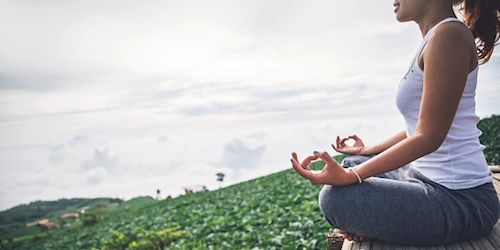What is Ayurvedic Yoga?
In Sanskrit, “Ayur” means life and “Veda” means knowledge. Ayurveda, originating from ancient India, is the science of health and healing – a comprehensive life science. Yoga, its ancient sister science, extends beyond physical and mental exercises, promoting a lifestyle aimed at achieving health and peace of mind. Some describe Ayurveda as the diagnostic aspect and Yoga as the therapeutic practice. Through a 200-hour yoga teacher training, one can delve into the foundational principles of Ayurveda, learning to balance mind, body, and spirit. A trained yoga instructor can guide you in harnessing the self-healing power of your body through the integrated practices of Yoga and Ayurveda.
WHAT TO EXPECT
The Portland Community College Ayurvedic Yoga Health Program consists of four modules (courses).
- Each module covers 50 hours of content in an 11 week college term (44 hours of class and a minimum of 6 hours of out-of-class preparation and practice).
- Take all four modules in any sequence that matches your schedule or take only those modules that are of most interest to you.
- Each module provides 38 PACE credits from the National Ayurvedic Medical Association.
CERTIFICATION
- Complete all four-50 hour modules to become certified by the Center for Ayurveda and Yoga Study. This Certification enables you to register with Yoga Alliance as a 200-hour Registered Yoga Teacher (RYT-200). You can then take our 300-hr yoga teacher training towards your Yoga Alliance requirements for a 500-hour Registered Yoga Teacher.
- Program graduates are also awarded a Non-Credit Ayurvedic Yoga Health Advisor Training Certificate from the Oregon Department of Education CCWD.
One-Year (4-Module) Program
Each module in our program teaches you how to tap into the healing potential of its respective season. By continuing throughout the year, you’ll experience how the seasons naturally promote health. These certified yoga instructor courses span a full year, ensuring comprehensive training and profound personal growth.
Winter: Ayurveda, Yoga and Tridosha
Discover how to balance the mind, body, and spirit through both Yoga and Ayurveda. Learn assessment skills and recommendations for perfect health. Includes cooking, restorative yoga, aromatherapy, Marma, breathing practices, basic herbs, and Mudras.
Spring: Ayurveda, Yoga, and Pachakarma
Emphasis on health management systems and proper balance with food, spices, nutrition, lifestyle, and daily routines. Covers Nasya (nasal oil drops), Neti (nasal cleansing), massage oils, powders, and preparatory process for Panchakarma therapy. Learn the basics of detoxifying in the Spring and discover the year-long health benefits. Learn how to prepare kitchari and basic teas.
Summer: Ayurveda, Yoga, and Self Care
Find health, beauty, wellness, and bliss from the inside out. Learn yoga and breathing recommendations for perfect health. The class covers both theory and practical applications from Mudra, Marma, and Bhandha to Asana, Yantra, and Mantra. Discover Ayurvedic foods, spices, recipes, and cooking tips for each constitution (Dosha) for perfect balance.
Fall: Ayurveda, Yoga and Philosophy
Learn about Ayurvedic anatomy and systems: the five elements (Panchamahabhutas), three bio-energies (Doshas), anatomy and body tissues (Dhatus), and universal qualities (Gunas). Discover how the sister sciences of Yoga and Ayurveda overlap.
MEET YOUR INSTRUCTORS
Ann Wagoner.
MA, CAP, E-RYT-500, Yoga Therapist, has taught yoga for over 25 years and is a certified practitioner of Ayurveda. She researched protocols and herbs for the prevention of cancer recurrence and is a NAMA presenter. She is also a student of Rama Jyoti Vernon and publishes yoga books.
Andrew Garland-Forshee
PhD, HS-BCP, RYT-500, CTSS, QMHP-R, currently serves as the Department Chair for the Family and Human Services program at PCC. He is a certified Yoga For All instructor focusing on accessible, inclusive, body positive yoga, and is licensed to teach LoveYourBrain yoga.
Jeevani Eigen.
MA, CST, AHP will present Doshic theory. She trained at the highly regarded school of Dr. Vasant Lad, The Ayurvedic Institute, in Albuquerque, NM. She has been a healing arts practitioner and teacher for 25 years.
Who Should Enroll in a 200-Hour Yoga Teacher Training Certification?
This program is ideal for current or aspiring healthcare practitioners, including massage therapists, nurses and nurse practitioners, nutritionists, homeopaths, naturopaths, chiropractors, medical doctors, acupuncturists, physician assistants, medical assistants, cranio-sacral practitioners, fitness professionals, and others seeking to become a certified yoga instructor. Practitioners needing PACE credits from the National Ayurvedic Medical Association to maintain their credentials will also benefit from this comprehensive training.
Tuition.
$799 per module (term)
Register.
Learn how you can register for the next term.
Contact.
Contact Ann Wagoner at ann.wagoner@pcc.edu.

